YOUR JOURNEY - COMPASSION
Redefining well-being through the best practices of Jungian psychoanalysis
What is Compassion?
Join us on this journey of self-discovery.
The Oxford Dictionary defines compassion as “The feeling or emotion when a person is moved by the suffering or distress of another, and by the desire to relieve it.” We all know that feeling, the emotions that run through you and the desperate need to end or at least alleviate another’s pain. Compassion comes as a result of first becoming aware of the situation, then we experience the common emotion and our wish to relieve the other person’s suffering. And finally, the action we take to assist. Compassion can be thought of as a response to feelings of empathy.
There are 3 types of compassion: compassion for oneself, compassion for others and compassion from others. Feeling compassion for others is often the easiest type to experience. We generally find it easier to show compassion than to receive it or even feel it for ourselves. It is ironic that we inherently want to help others but we often tend to find it difficult to receive help, let alone show compassion to ourselves.
As with any journey, the first step is awareness – What does compassion mean to you?
“To me, God and compassion are one and the same. Compassion is the joy of sharing. It’s doing small things for the love of each other-just a smile, or carrying a bucket of water, or showing some simple kindness. These are the small things that make up compassion.” Mother Teresa
Compassion need not be one large act, often it is the small acts of compassion and kindness that make the biggest difference to those around us and ourselves. For the moment all we ask is that you gain an understanding of what compassion means for you and become aware of all the small acts of compassion that cross your path.

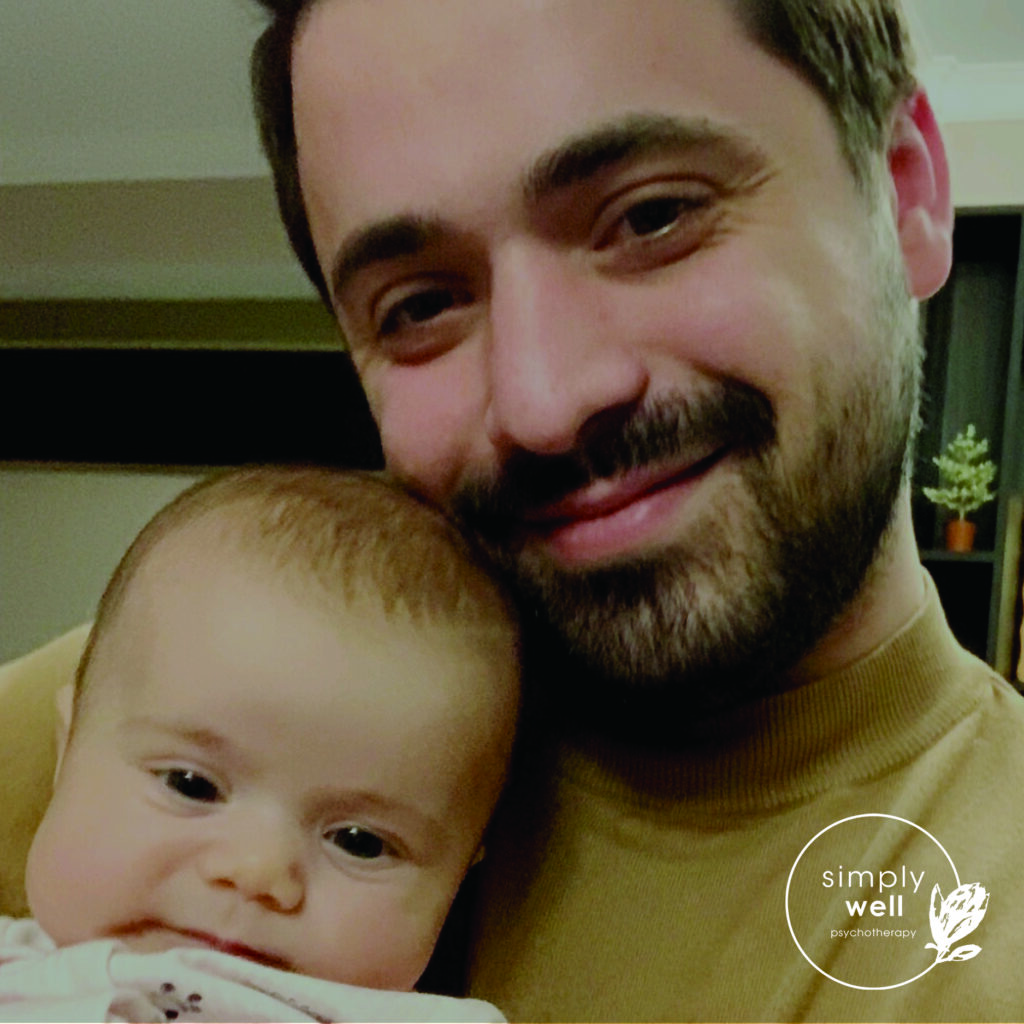
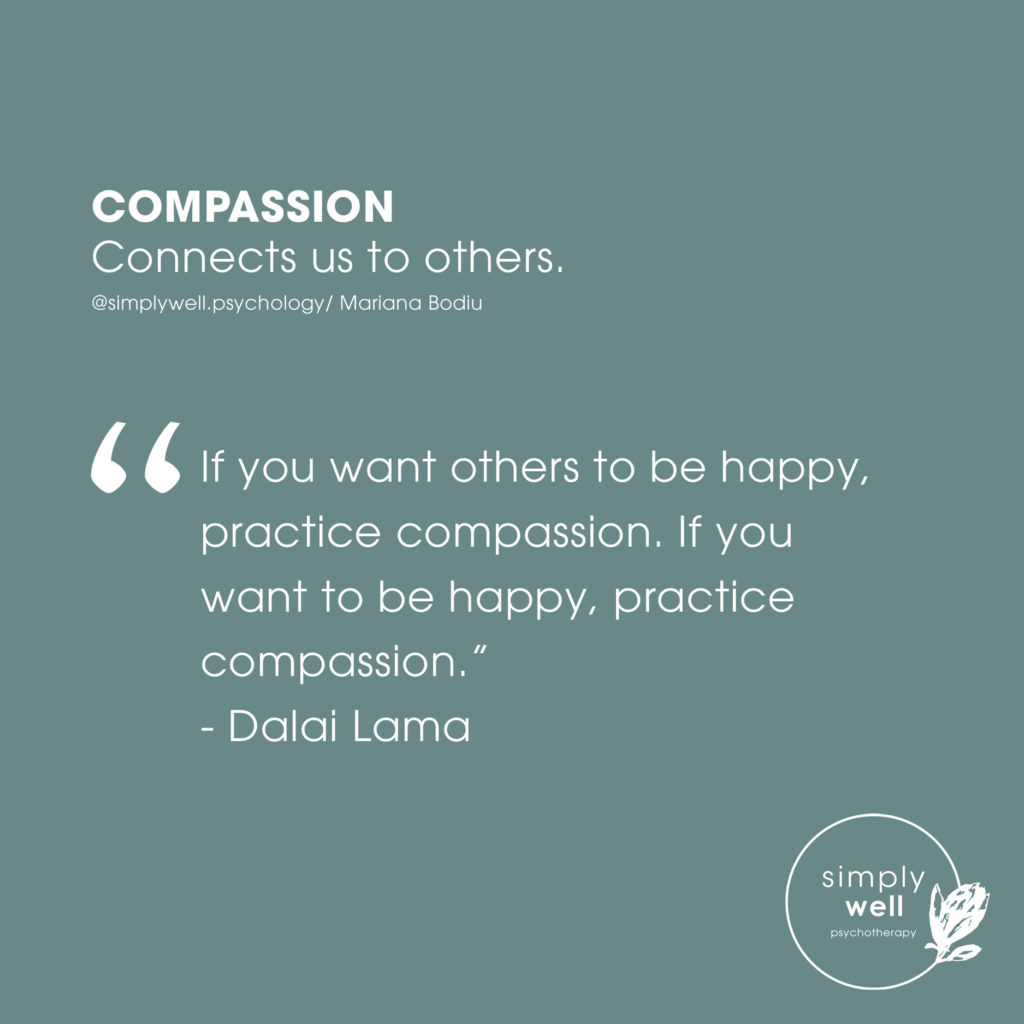
Compassion – a journey of discovery
“Compassion is the greatest form of love humans have to offer.” – Rachel Joy Scott
Love is at the core of compassion. My brother Cornel, on the 14th of November 2022, he became a proud father to his beautiful daughter Mia. Isn’t she a blessing? His journey had been a rocky one, with stellar success and ongoing hard work in becoming the man he is today. A human, with a great heart, a brother and an absolute pain in the ass at times. But yet, he is my pain in the ass, because he is the only brother I’ve been gifted to have in this journey of life. My brother changed. His long-lasting dream of becoming a father has finally come true and yes it changed him. It made him kinder, softer & stronger, more connected to himself and to his wife Ana. Ana taught him to be a greater man. She awoke that dormant knowing in him, the knowing of being deserving, loved and truly respected.
Let us celebrate fatherhood with as much joy as we do motherhood. Let us celebrate men!”
“If you want others to be happy, practice compassion. If you want to be happy, practice compassion.” – Dalai Lama
Imagine a world without compassion. Compassion connects us to others through what is often a difficult situation. It’s when we don’t look away, it’s when we reach out wanting to ease another’s pain. There is nothing crueller than indifference.
Journaling is always a great way to put our thoughts to paper. Journaling helps provide clarity and insights we otherwise would not have gained. Think back to all the acts of compassion you have shown to others and how those large and often small acts made a meaningful difference.
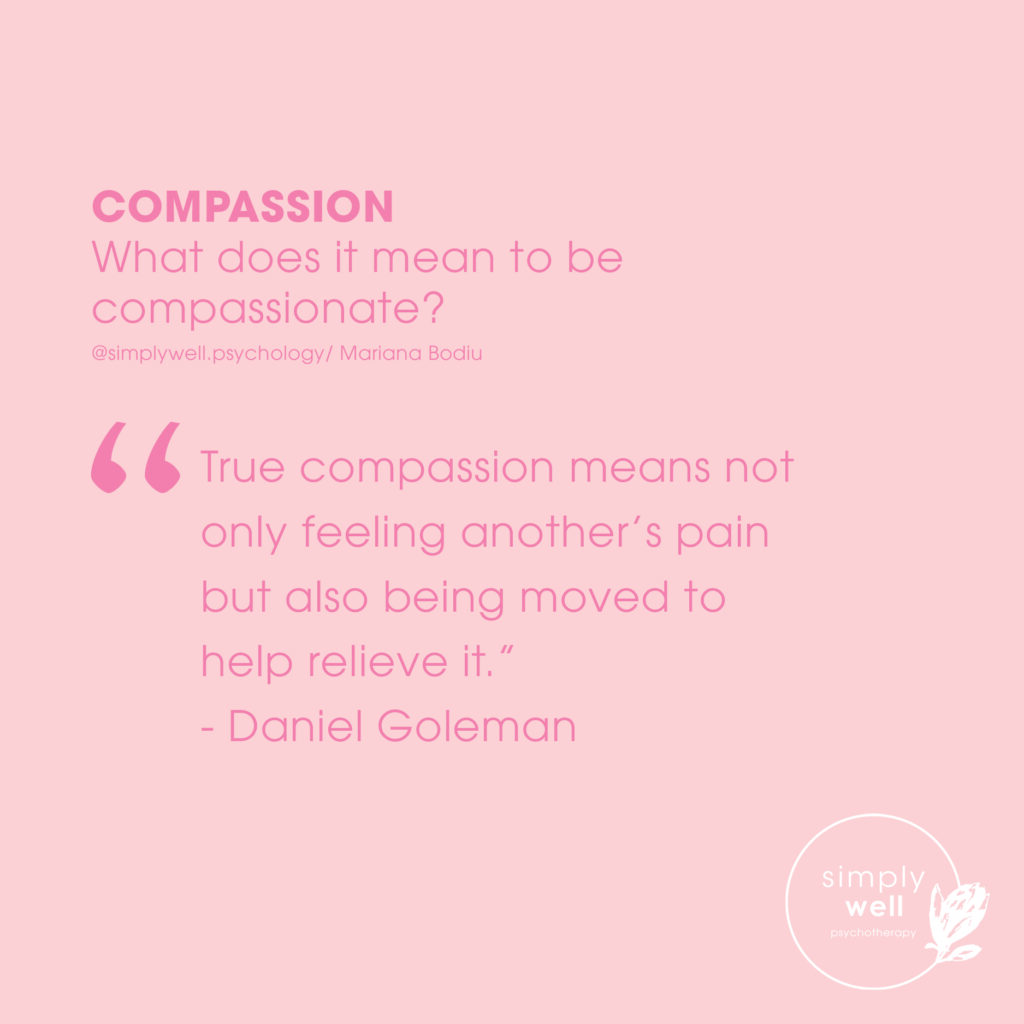


What does it mean to be compassionate?
Compassion helps us move forward. When we are compassionate, we are recognising that everyone suffers, that everyone feels pain, and that everyone makes mistakes. When you feel compassion, you are being mindful of others’ feelings. Compassion unlike empathy provides a willingness and understanding that there is a solution. When we feel compassion, we are feeling deeply – another’s pain touches our hearts.
Sometimes the solution we all need is simply having someone recognise our pain, simply having someone see our pain and stand alongside us with the best of intentions. As Daniel Goleman says, “True compassion means not only feeling another’s pain but also being moved to help relieve it.” We have all lived through pain and suffering which is why it is easier to understand someone else’s pain. We feel moved to help and somewhere inside us, we know that it can and will become better.
I would like to leave you with two quotes to think about from Mother Theresa.
“Kind words can be short and easy to speak, but their echoes are truly endless.”
“Not all of us can do great things. But we can do small things with great love.”
Compassion for all
“We can’t heal the world today but we can begin with a voice of compassion, a heart of love, an act of kindness.” – Mary Davis
It’s time to grab your journal and dig a little deeper. Today is a day of questions, what we love about questions is that as soon as they are asked, our brains can’t help but want to answer them.
As I mentioned earlier it is so much easier to show compassion than accept it from others, let alone show it to ourselves.
- Think back to those moments when you were fortunate enough to feel compassion from others.
- How did those moments help you through what would have otherwise been a dark and lonely time had someone else not given you a bit of light?
- How easy do you find it to feel compassion for others and how easy do you find it to feel compassion for yourself?
- Do you find it easier to show compassion to others but find it difficult to be compassionate with yourself?
When we find it difficult to show ourselves compassion are we saying that we aren’t worth it? It is often said that if you cannot love yourself, you cannot truly love another, perhaps the same applies to compassion. If we practice self-compassion, we gain experience on how invaluable it is – why do we find it so much easier to be kinder to others?
What are your self-limiting beliefs around showing self-compassion?
“Compassion is at the heart of every little thing we do. It is the dearest quality we possess, yet all too often it can be cast aside with consequences too tragic to speak of. To lose our compassion, we lose what it is to be human” – Anonymous
Take time to reflect on the insights you have gained over the past 2 weeks. Step back a bit, it’s not all about hard work, spend time noticing those small acts of compassion you see, those small acts of compassion you give and receive. Just notice and smile because those are good feelings. Those are acts that can instantly change someone’s day – sometimes random acts of kindness can be the greatest form of compassion.
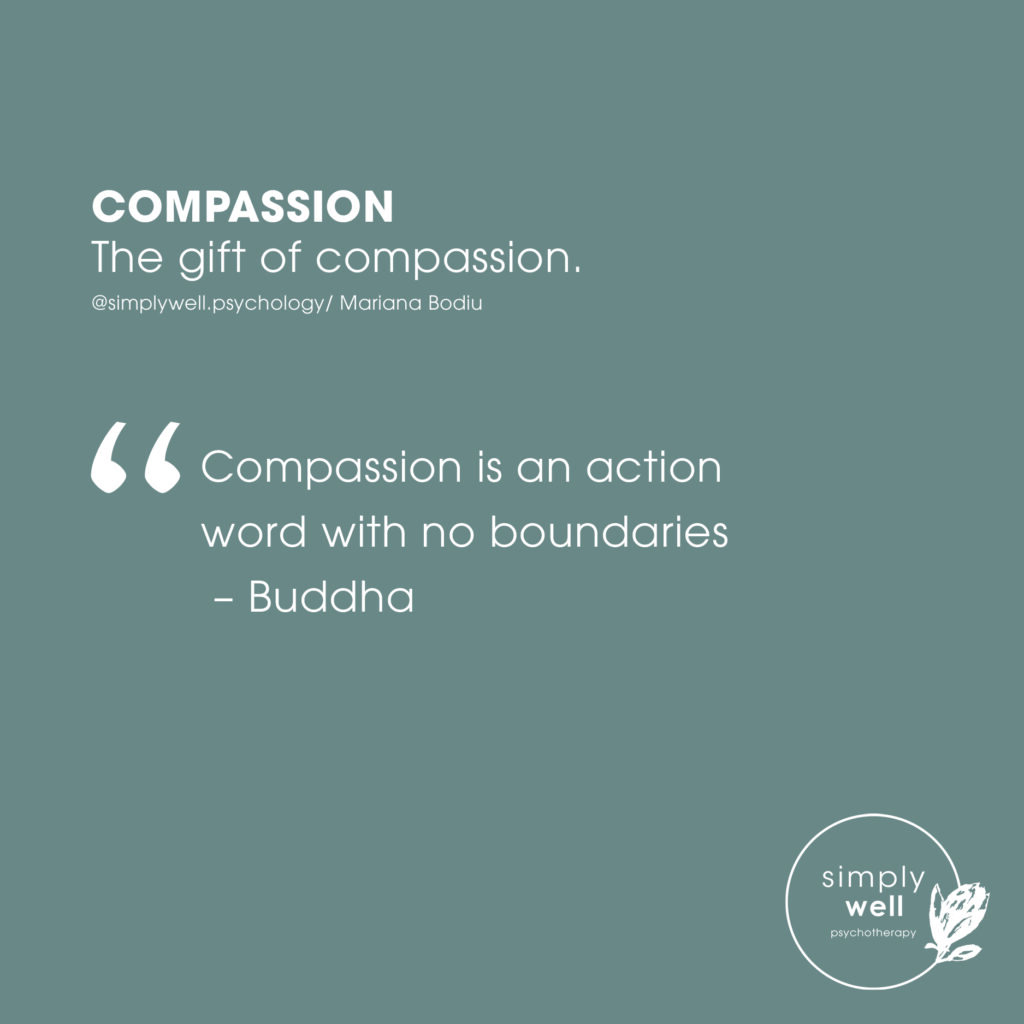

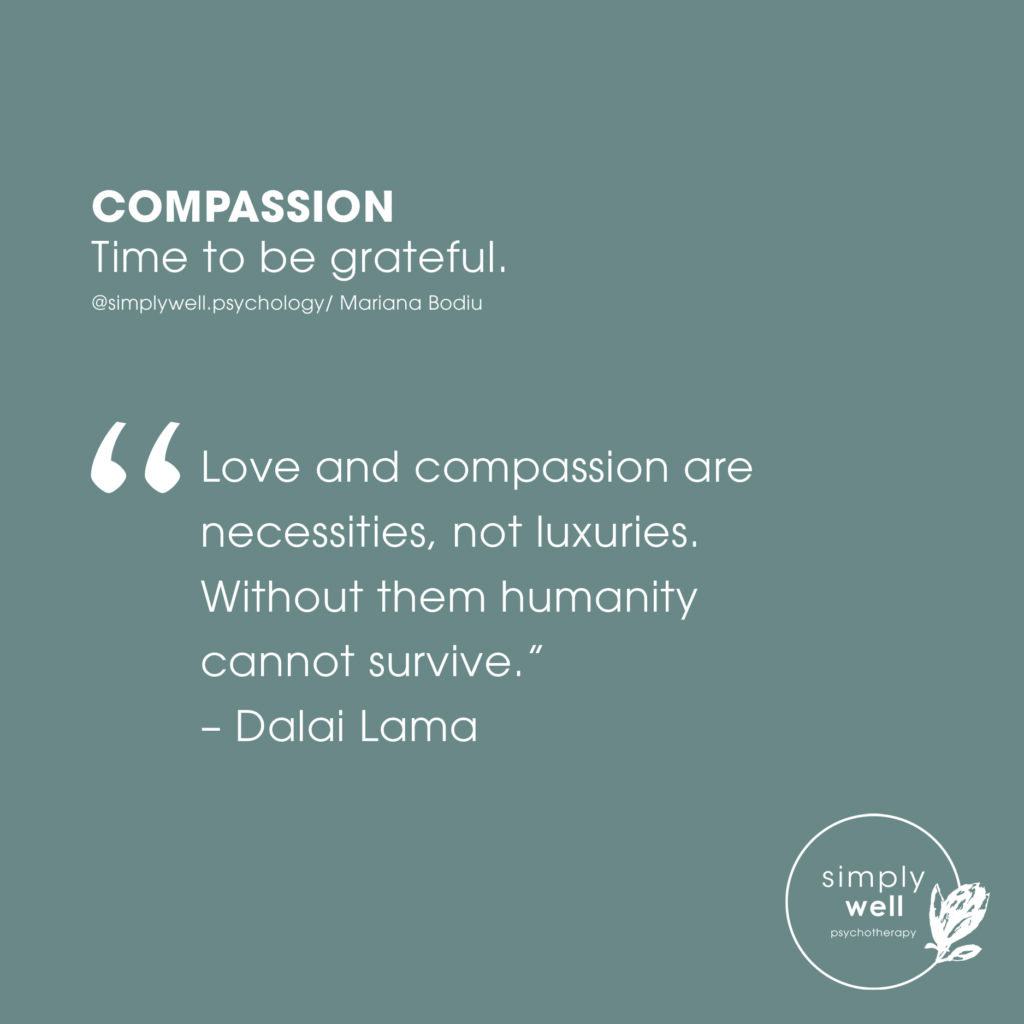
The gift of compassion
“Compassion is an action word with no boundaries” – Buddha
Compassion truly is a gift. Compassion says I see you and I see and feel your pain. I want to help. Compassion automatically connects all of us; we feel the suffering together. It becomes a shared burden. As the Buddha says there are no boundaries. We go in boots and all with one goal – to make the situation better. Compassion comes in many forms. It can be in the form of kind words, it can be in form of a gesture, and it can be in the form of assistance. But it is an act without thought for ourselves. Compassion is an expression of our humanity; it is a pure expression of love. When we feel true compassion, there is no judgment, there is no hidden reason, and we are not trying to gain something for ourselves.
“One looks back with appreciation to the brilliant teachers, but with gratitude to those who touched our human feelings. The curriculum is so much necessary raw material, but warmth is the vital element for the growing plant and for the soul of the child.” Carl Jung
Practicing the gift of compassion
“As far as we can discern, the sole purpose of human existence is to kindle a light in the darkness of mere being.” – Carl Jung
Fortunately, the act of compassion comes naturally, well, most of the time. Sometimes it is easier to show a complete stranger compassion than it is to show those we know or love. And that is all down to the lack of baggage!! When it comes to those we love, there are so many other emotions bubbling under the surface. There are the lists of perceived injustices, the irritations – all those moments we haven’t actually forgiven or forgotten. It can make us hard and unforgiving. Sometimes when there is unresolved baggage, we don’t notice the moments those loved ones need compassion, part of us almost feels like they got what was coming to them.
Like that colleague who finally got caught doing something that has irked us for ages. Or that sibling or friend who still hasn’t apologised for something they did 3 years ago. Take time to reflect and think about whether or not your past is holding you back or preventing you from seeing someone’s pain and suffering. Is your past stopping you from being someone’s compassion-angel? Sometimes showing compassion for those people will mend a relationship, causing all the past pain, hurts and regrets to wash away. Remember compassion instantly connects us and perhaps that much needed compassion is far more important than any perceived slight.
Are you missing moments that could change your relationships? Are you missing those moments where you could let go?
“Love and compassion are necessities, not luxuries. Without them humanity cannot survive.” – Dalai Lama
As we end this week, take the time to be grateful, to show thanks for all the compassion in the world. We are all impacted by acts of compassion, sometimes without even realising it. Kindness and love have a rippling effect. Someone who experienced a moment of love, kindness and compassion will interact very differently with everyone they come into contact with that day, than had they not received it.
Sometimes we are the recipient of someone else’s kindness, simply because they were shown an act of compassion.
Compassion makes each of our lives a happier place to be and we are all connected. Imagine how incredible the world would be if each and every person encountered daily acts of compassion, imagine how we would treat each other if we came from a place of feeling supported, understood and valued.
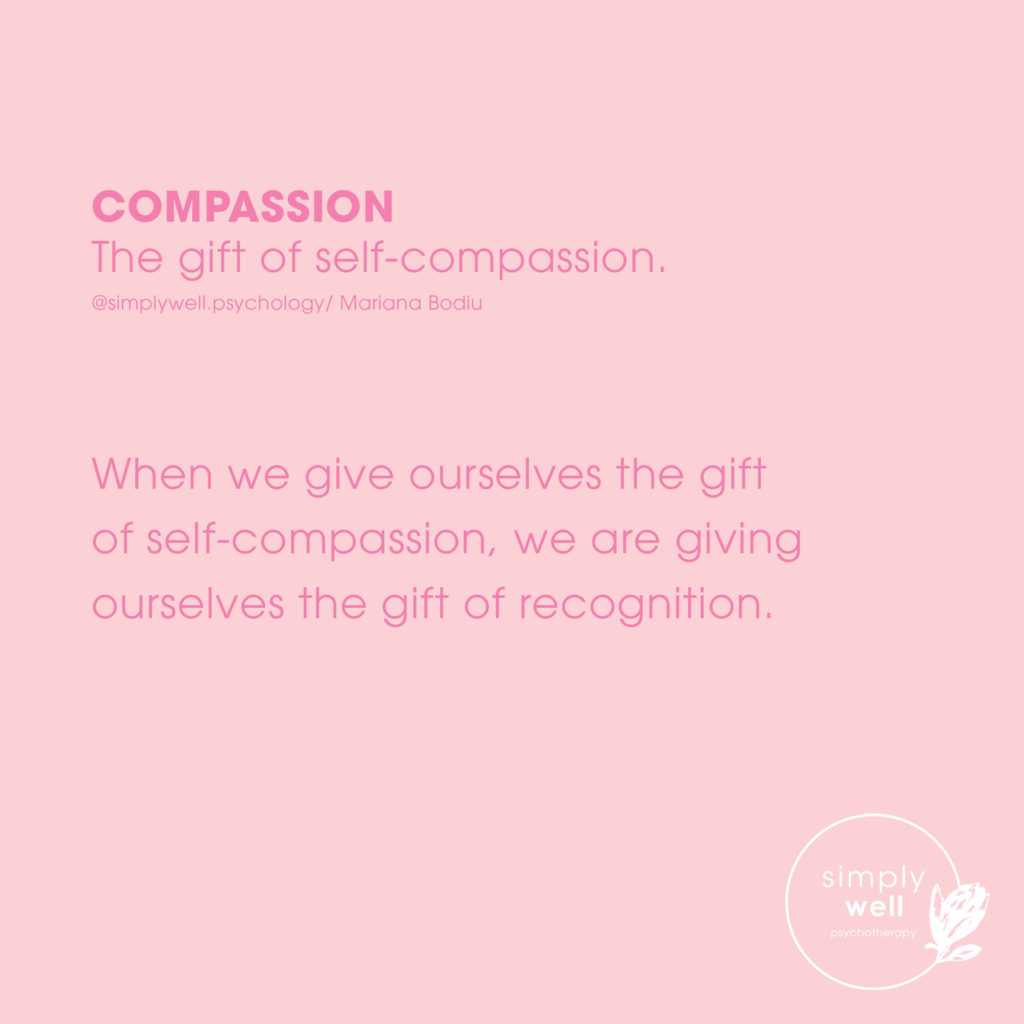

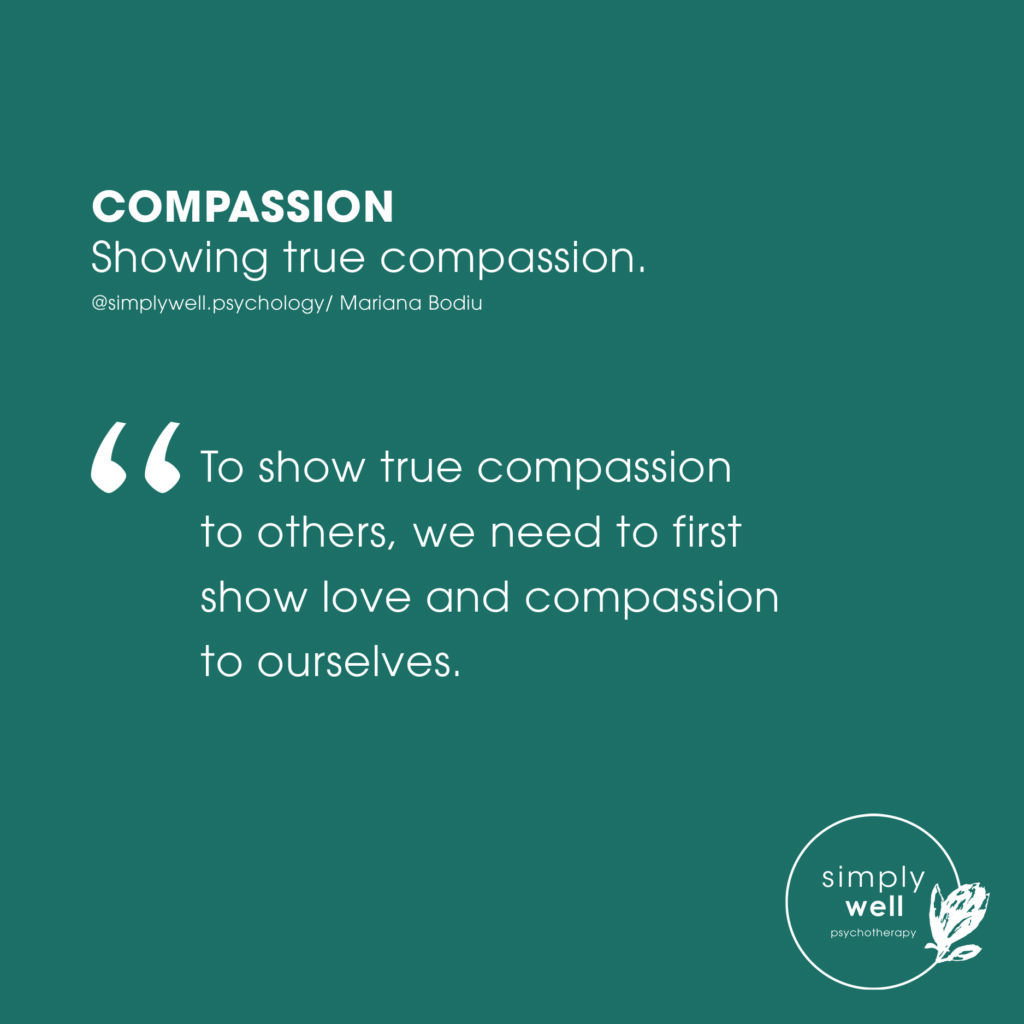
The gift of self-compassion
“If your compassion does not include yourself, it is incomplete.” Buddha
Self-compassion is not always easy. Just listen to your inner narrative, and how you talk to yourself. Most of us are guilty of negative self-talk, we have no problem scolding ourselves, telling ourselves how stupid we are or that we deserve what has happened. What would happen if we spoke to others the way we spoke to ourselves? We would probably be very lonely!!
When we give ourselves the gift of self-compassion, we are giving ourselves the gift of recognition. Recognition that everyone makes mistakes, that everyone suffers and that everyone feels pain. We are acknowledging the situation but simultaneously giving ourselves the fortitude and resilience required to cope with stressful events.
We are mindful of our struggles, but we are responding with kindness. We should embrace ourselves despite our imperfections, just as we embrace others despite theirs. We provide ourselves with a safe space to admit our mistakes rather than resorting to blaming. We provide ourselves with that all-important space of knowing that there is a solution, a way to move forward.
Practicing the gift of self-compassion
“Self-compassion is simply giving the same kindness to ourselves that we would give to others.” Christopher Germer
It’s journal time again, yes, those all-consuming questions are about to be released 😊 What are your limiting beliefs around practicing self-compassion?
- Is self-compassion selfish?
- Is self-compassion weak?
- Is self-compassion self-indulgent?
- Do you not deserve self-compassion?
When we criticize ourselves, we undermine our self-confidence but when we show ourselves compassion, we are using that source of inner strength. We are showing ourselves that we still believe we can reach our goals or potential. We still have standards, but we just aren’t beating ourselves up. We are not excusing our behaviour but rather leaving ourselves space to still feel motivated.
Try writing a letter to yourself. Acknowledge your struggle, write it out and then write to yourself as if you were speaking to someone else. Write from your compassionate self to the part of you that is struggling. This is something you may not find easy but relax and breathe. Just look at what is happening, no judgement, no need to identify with any of the emotions. Just be aware of how it feels to treat yourself with kindness and love.
“Self-compassion is key because when we’re able to be gentle with ourselves in the midst of shame, we’re more likely to reach out, connect and experience empathy.” – Brene Brown
“It is a lack of love for ourselves that inhibits our compassion towards others. If we make friends with ourselves, then there is no obstacle to opening our hearts and minds to others.” – Anonymous
To show true compassion to others, we need to first show love and compassion to ourselves. We are not alone in this world, we have each other and we have ourselves. Treating ourselves with compassion, love and kindness allows us to treat others with compassion, love and kindness. Take time to be kind to each and everyone who crosses your path, including yourself. As the lyrics go, “Make the world a better place” – bet you are silently or not so silently singing right now.
And so, comes the end of our compassion journey and I leave you with this quote by Nelson Mandela, “We can change the world and make it a better place. It is in your hands to make a difference.”

